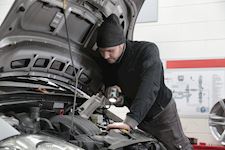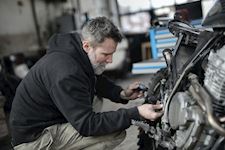Mechanics (Machines) - Endorsed Certificate Course (TQUK - Training Qualifications UK)
Distance learning course with study materials, tutor support and final exam included
Academy For Distance Learning
Summary
- Certificate of completion - Free
- Exam(s) / assessment(s) is included in price
- Tutor is available to students
Add to basket or enquire
Overview
Mechanics (Machines) Online Course. 100 Hours Endorsed Certificate Course (TQUK - Training Qualifications UK).
Mechanics Course Online: Learn the mechanics behind the maintenance and repair of machinery. This distance learning course is not only relevant to cars. It is relevant to any machine with an engine or a motor, including those found in the home. Gain an understanding of how machines work, so that you can undertake servicing and repair jobs yourself.
This is an ideal course for DIY Enthusiasts and a great foundation programme for apprentices either working in or wanting to work in the service and repair of cars, farm machinery, home appliances, lawn mowers and many others.
Machines have become so much a part of modern life that we can easily take them for granted. Most people don’t even give a second thought to how the machines they use are functioning; that is until they stop functioning.
Learning more about mechanics can enable you to do so much more with machines though, from using them more appropriately and safely to maintaining and repairing them when required. Some machinery is relatively simple and easier to learn about, but other machines can be much more complex and will require far more learning and experience to properly understand.
This course is the cornerstone for understanding and working with all machines, each lesson building upon what you learnt in the previous ones, gradually expanding your awareness and understanding of how and where engines can be used to power machines, and how different types of machines function.
Benefits of an ADL Endorsed Course?
Endorsed courses are skills based. They have been evaluated and approved by an independent awarding body such as Training Qualifications UK (TQUK).
What makes ADL’s Endorsed courses different?
- Flexible Self-Paced Learning– adjust your learning around your home and work commitments
- Start and Finish at any time
- Courses globally and industry relevant
- Practical Component at the end of most lessons.
Allocated your own tutor relevant to your subject. You can have as little or as much contact as you like with your tutor. They are there to support you all the way through.
This course is endorsed by TQUK -Training Qualifications UK, an OFQUAL awarding body.
Achievement
Course media
Description
Lesson Structure: Mechanics (Understanding and Working With Machines) BSS102
1 Introductory Mechanics
- Introduction
- Power Sources
- Engines
- Steam Engines
- Petrol Engine
- How an Engine Works
- The Operating Cycle
- Stages in a Four Stroke Spark Ignition Engine Cycle
- Stages in a Two Stroke Spark Ignition Engine Cycle
- Electric Motors
- Parts of an Electric Motor
- Types of Electric Motors
- Comparison of Electric and Petrol Engines
- Applied Tasks: Changing a Wheel, Mending a Puncture
2 Engine Features
- Measurements and Mechanical Principles: Force, Load, Pressure, Relationships in Pressure Measurements, Absolute Pressure, Force of Gravity, Centre of Gravity, Specific Gravity (Specific Weight), Density, Volumetric Efficiency, Vacuum, Work, Power, Energy, Bore, Piston Displacement, Compression Ratio (CR)
- How to Convert Imperial Measurements into Metric
- Engine Efficiency: How Does an Engine lose Power?
- Features of Electric Motors
- Applied Tasks: Spark Plugs, Checking for fouling and damage/ reading the spark plug
3 Machines and their Parts
- Parts of a Machine: Engine Systems, Lubrication System, Transmission System, Cooling System, Fuel System, Transmission System, Gearbox (transmission), Clutch (torque converter), Differential, Prop shaft/ drive shaft
- Power Source and Ignition: The Ignition System, Distributor, Coil pack
- Other Machines: Outdoor Multi Tools, Domestic Maintenance Equipment, Kitchen Equipment
4 Drive Mechanisms
- Introduction
- Cog Drive Machinery
- Belt Drive Machinery
- Transmission Drive Machinery
- The Transmission System
- Applied Tasks: Replacing Drive Belts
5 Managing Machinery Deterioration
- The Lubrication System
- The Cooling System
- Lubrication: Oil Viscosity, Delivering the Lubricant, Splash System, Pressure System, Combination Pressure and Splash
- Types of Lubrication Pumps
- Types of Filter Systems
- Materials Deterioation
- Metals - Ferrous: (Iron) Materials, Steels, Heat Treatments, Aluminium, Copper, Lead, Zinc, Tin, Nickel
- Non-Ferrous Alloys: Brass, Bronze, White Metal, Solder
- Seals
- Servicing Filters: Air Filters, Oil filters, Fuel Filters
- Servicing the Filters: Air Filters
6 Optimizing Machine Operation (Getting the most from Machines)
- Introduction: Adjustments, Controlling Power, Carburettors (for petrol engines), Types of Carburettors, How a Carburettor Controls the Fuel Mix, Number of Barrels
- Lubrication
- Exhaust Systems: Catalytic Converter, Muffler, Extractors
- Turbochargers: Intercooling, Wastegate, Blow off valves, Twin vs single turbo, Boost controller
- Superchargers: Temperature effects
- Applied Tasks: Servicing a Carburettor
7 Brake Systems
- Introduction
- Drum vs Disc Brakes
- Drum Brakes and Shoe (Pad)
- Disc Brakes
- Brake Systems –Pneumatic
- Hydraulic and Electric Brakes
- ABS (Anti-lock Brake System)
- Regenerative braking
- Applied Tasks: Servicing Brakes, Jacking up the vehicle to change or service brakes, Changing Disk Brakes, Changing Drum Brakes, Motorcycle Brakes, Push Bike Brakes
8 The Machine Workshop
- Introduction
- Tool Maintenance
- Work Bench
- Vices and Clamps
- Lifts, Ramps, Jacks, Ladders
- Tightening Pullers
- Pulleys
- Winches
- Generators, Battery Chargers
- Cleaning Equipment
- Grinders, Sharpening Equipment
- Work Pits and Hoists
- Measuring Equipment
- Spanners and Allen Keys
- How to Use Spanners
- Pliers and Grips
- Screwdrivers
- Files
- Cutting Equipment
- Hammers, Chisels and Punches
- Tap and Die Cutters
- Lubrication Equipment
- Drills
- Saws
- Soldering
- Welding: Oxy-fuel welding, Shielded metal arc welding (SMAW), Gas tungsten arc welding (GTAW), Gas metal arc welding (GMAW), Flux-cored arc welding (FCAW), Submerged arc welding (SAW), Electroslag welding (ESW), Electric resistance welding (ERW)
9 Machine Maintenance and Repair
- Introduction
- Servicing a Typical Motor Car
- Inspect Oil levels/Engine/transmission – Change oil filter, fuel filter
- Changing spark plugs/ cleaning / gapping resizing /Installing
- Inspect Coolant levels
- Inspect tyre pressure/tread condition (should be done regularly if not every 6 months)
- Change Fuel Filter
- Check brakes – brake fluid
- Wheel Alignment
- Power steering fluid
- Electrics – indicators, brake lights, headlights, windscreen wipers and fluid, hazard lights, horn
- Replacing light bulbs
- Servicing Garden Equipment
- Oil
- Dirty Spark Plugs
- Mowers
- Changing Mower Blades
- Chainsaws
- Outdoor Electric Machines
- Treating Rust
- Painting Metal
Who is this course for?
Mechanics, Engineers, Fabricators, Enthusiasts,
Requirements
A pc or laptop with internet connection.
Career path
There are countless career options such as vehicle mechanic, technician, workshop supervisor, garage manager etc. You could also work as a breakdown engineer or MOT tester, or specialise in a particular area like motorsport engineering.
Questions and answers
How to connect with provider and how can I get the books
Answer:Hi Ahmed Ali Many thanks for your question. The course details and syllabus is sent to you within 24 hours of purchase, where you receive your student log-in details for ADL's website. You are assigned your own tutor, who is available to you whenever you require them. The course is online and can be completed under your own schedule, where you can "log-in" anytime day or night. If you require any additional information please let me know. Kindest regards Amanda White General Manager
This was helpful.Would I received an accredited certificate form TQUK or from your organisation upon completion?
Answer:Dear Sam Many thanks for your question. You do indeed receive a TQUK Certificate (Hard Copy) plus a transcript posted to your address, after completion of the course. ALL of ADL's courses are recognized by the Ofqual awarding body TQUK, which endorses the courses & benchmarks the levels. If you require any additional information please do not hesitate to contact us. Kindest regards Cara Gage General Manager
This was helpful.
Certificates
Certificate of completion
Digital certificate - Included
Reviews
Currently there are no reviews for this course. Be the first to leave a review.
Legal information
This course is advertised on reed.co.uk by the Course Provider, whose terms and conditions apply. Purchases are made directly from the Course Provider, and as such, content and materials are supplied by the Course Provider directly. Reed is acting as agent and not reseller in relation to this course. Reed's only responsibility is to facilitate your payment for the course. It is your responsibility to review and agree to the Course Provider's terms and conditions and satisfy yourself as to the suitability of the course you intend to purchase. Reed will not have any responsibility for the content of the course and/or associated materials.





